Instantiation Read online
Page 32
Mathis rose from his armchair. “I should start checking the mosaic,” he said.
“Do you need a meal first?” Sagreda asked.
“No, a few gulps from her Ladyship’s ancient veins seem to have gone a long way.” He took a seat at the writing desk and peered studiously at Sagreda’s notes.
Sagreda joined Lucy on the sofa. “My landlady will be bringing me my dinner in about an hour,” she said. “So you and Mathis will need to hide for a bit, though of course you’re welcome to eat with me when the coast’s clear.”
“I’ll be getting back to my own digs before then,” Lucy decided.
“What you saw last night means you might not be safe,” Sagreda said gently. “If the people we killed are too important to the story, what we did might be undone – and if the rules of the world don’t allow that, we’ll need to be discarded to smooth over the lie.”
Lucy wasn’t ready to take any of this on faith, but some part of Sagreda’s warning seemed to unsettle her. “I can find out what’s happened in that house since we left it,” she said. “If they’ve buried them blood-suckers and started sending all their finery to the auctioneer, will that put your mind at ease?”
“It’d be worth knowing,” Sagreda replied. “But can you do that without letting on to anyone what you actually saw?”
Lucy was offended. “I ain’t no tattler!”
“I don’t mean the police,” Sagreda stressed. “I mean anyone at all. Not even someone you’d trust with your life. Telling them could put them in danger, too.”
“Leave it with me, Captain,” Lucy replied. “By the time you’ve had your dinner, I’ll be back with my report.”
9
“This looks perfect to me,” Mathis declared, putting the mosaic aside and rubbing his eyes. “But there is one small complication we need to think about.”
“What’s that?” Sagreda asked.
“Peyam’s dictionary was calibrated for sunlight,” he said. “Whatever the lighting, the colors still look right to us when we check them against a white background, but that’s just our visual system compensating. The GPU models physical optics, not perception; it’s going to spit out pixels that depend on the light source.”
Sagreda had known there’d be an extra hurdle to deal with as soon as Mathis had turned up in his new, photosensitive state, but she’d been so preoccupied with finding the cobalt blue that she’d stopped thinking about the problem. “Okay, so we’ll need to use a mirror to light the thing in the morning without roasting you to a cinder.”
“That would be nice.” Mathis glanced down at the desk, and gestured at the collection of wooden rods beside the blotter. “I see you’ve got the pieces of the trigger ready. So we might as well start setting up.”
“Of course.”
They worked together, mostly in silence. They’d performed the same task so many times before that the need to bounce sunlight from a chink in the curtains onto the mosaic via the Captain’s shaving mirror felt like a welcome variation to the routine that would keep them from becoming complacent. But the hardest thing now for Sagreda was to stop worrying about Lucy.
Mathis dropped a plumb-line from the main guide-string that stretched across the room between an anchor on the wall and the home-made easel holding the mosaic, and marked the viewing spots on the floor for the two of them. “I guess you don’t know how high Lucy’s eyes are?”
“I should have measured her while she was asleep.”
“It’s almost midnight,” he said. “Do you really think she’s coming back?”
“She has to.”
“Maybe she heard that Percy and Mary got an ad hoc exemption to the vampire killers’ rulebook,” Mathis speculated. “In which case, the show can roll on without anyone disappearing: the Shelleys can vow revenge on their attackers, but Lucy’s not a liability any more, she just gets to spread the story that lets everyone in Midnight know how indestructible they are. Stake through the heart, no problem! They’re like that guy with bad hair in No Country for Old Men.”
“None of mine saw that,” Sagreda replied distractedly. She walked over to the window and looked down onto the street. Lucy was standing outside the building, and the fog was rolling in.
She gestured to Mathis to come and see.
“Okay,” he said. “Shall I go down and try to talk her into committing? Maybe if I start humming ‘Consider Yourself’ that’ll be enough to persuade her; I don’t think I’m up to the whole dance routine.”
“I’ll go.”
“Not alone, at this hour.”
They went together.
Lucy must have been in two minds about joining them, but she didn’t flee when they approached her. “What did you find out?” Sagreda asked.
“The other blood-suckers are holding a ceremony tonight, to bring back them ones you killed. They got all the big sorcerers coming to the house: Dee, Crowley, Tesla, Twain.”
“Twain?” Sagreda boggled.
“I knew it!” Mathis crowed. “The SludgeNet never met a rule it wasn’t willing to break.”
“You’re probably safe, then,” Sagreda told Lucy. “But you can still come with us if you want to.”
“I can’t leave my friends,” Lucy replied. “Who’d look out for them, if I wasn’t around?”
“At least come up and join us until morning,” Sagreda suggested. “No one should be out on a night like this.” The fog was so thick now that she could barely see Mathis, pacing impatiently behind Lucy.
Lucy hesitated. It was clear that she’d been hanging back instead of bringing them the news because, safe or not, she was afraid of being tempted to flee all the hardship she faced in Midnight to follow the Captain’s mad dream. To an actual nineteenth-century pickpocket, every word of it would have sounded like gibberish, but something must have punctured her Stockholm Syndrome and shaken a few rusty twenty-first century insights out of the silt at the bottom of her mind.
“This is how traitors die!” a man’s voice whispered.
Sagreda looked up to find that where Mathis had been, the fog was filled with a thick red mist. A blur of metal blades were tracing arcs through the air, through what was left of his body.
She cried out in shock and pulled Lucy toward her, away from the carnage. But then she froze: she had to do something, she had to find a way to rescue him. She watched the dancing blades, hypnotized, as if she could run their motion backward just by staring at them hard enough.
“He’s gone!” Lucy shouted, tugging at her hand, trying to pull free of her grip. Sagreda broke out of her trance and let the girl go, then after a second she turned and followed her, bolting down the street so fast that it felt as if the ground had tipped and she was racing downhill, and if she tried to halt she’d only start tumbling.
As she watched Lucy fading in and out of sight in the swirling fog beneath the gas lamps, Sagreda wondered why she was even bothering to flee. She should have stayed and died beside Mathis. There was no other way she could find peace. There was no other kind of freedom.
Lucy’s pale form receded into the darkness. Some instrument of torture began squeezing the Captain’s chest, but Sagreda ran on, soaked in sweat and condensation, waiting for a flock of assassins to swoop down on her and drag her up into the sky so she could finally fall to Earth as a rain of blood and gristle and be done with it.
A boy appeared out of the shadows and gestured to Sagreda to follow him. It was Sam. He turned off the street and the two of them ran down an alley and a set of stairs into a pitch-black basement. Sagreda heard a door being closed behind her.
Someone lit a lamp. This was the place where she’d met Lucy to plan the heist; Lucy and half a dozen other children were here now.
Sagreda sat down on the bare wooden floor and covered her face with her hands.
Lucy said, “They won’t go out of their way to find us now. Your friend was one of their kind, that’s why they made an example of him.”
Sagreda replied without looking
up. “Do you really not understand that it’s all bullshit? If there are two tribes of beings that owe loyalty to each other, we’re all of us in one, fanged or not, and the customers are the other. We should slaughter them, every chance we get, until they hate this game so much they’ll take up ten-pin bowling and leave us in peace.”
Lucy didn’t answer her. Sagreda pressed the heels of her palms into her eyes. She didn’t know how to grieve for Mathis; some splinter of ice in her contributors’ hearts was whispering that he’d never been more than a digital mash-up of crude approximations to a hundred humans all long dead. As she was herself. The sooner she found a way to be deleted, the better.
And she knew how. It would be instant, painless, easy, and final. She just had to change the mosaic so that it unlinked her from Midnight, without placing her in any queue for entry into another world. Her mind would cease to be executed, and within a few milliseconds the SludgeNet’s garbage collector would reclaim the space she was occupying and put it to better use.
Sagreda uncovered her face and wiped her tears away with the back of her hand. “Thanks for all you’ve done for me, but I need to go now.” She reached into her pocket, took out all the coins she had, and placed them on the floor beside her. Then she rose to her feet and started toward the door.
Lucy said, “Just stay until dawn, Captain. There’s nothing now can’t wait for morning.”
Sagreda stopped where she was, and Lucy came and led her – as she might guide a lumbering, docile animal – to a mattress in the corner of the room.
10
Sagreda was woken by a narrow shaft of sunlight that had entered the basement. The beam wasn’t even touching her skin, but the illumination it brought into the room was enough to penetrate her eyelids and drag her out of her broken sleep.
None of the pickpockets were awake yet. Someone had removed the Captain’s shoes and left them by the mattress, so Sagreda picked them up and walked quietly to the door. It was better to have no goodbyes.
She was halfway back to the Captain’s lodgings when Sam appeared beside her.
“What do you want?” she asked numbly.
He hesitated, as if gathering his courage. “I remember watching Neil Armstrong step onto the moon,” he said.
“Congratulations,” Sagreda replied. She wasn’t being sarcastic, but she didn’t know what he expected her to do with this confession.
“Lucy told me all your stories, but she only half believes them,” Sam persisted. “I know they’re true.”
“So you know where you are, and what you are.” Sagreda shrugged. “Good for you. I wish you luck making something of it. I tried, but it came to nothing.”
“You can’t give up!” Sam said, alarmed at her indifference. “I need you to teach me what you know. I can’t keep living here, half-starving all the time, pretending all this supernatural gibberish is true. Pretending I’m a child, when I’m not. I need to learn how to escape.”
Sagreda strode on in silence, listening to the clomp of horse-shoes on the road beside them, trying to find the words to brush him off without making herself feel like a monster. It had taken Peyam months to explain all the intricacies of the traveler’s art to his students. She wished the boy well – or the man, presumably – but she didn’t have it in her to stick around for that long.
They were almost at Mrs Trotter’s house when the solution came to her. “If I offered you The Great Gatsby meets The Three Stooges, would that sound like a place you could live in for a while? Flappers, cocaine, Keystone Cops … what more could you want?”
“Will you be coming with me?”
“No,” Sagreda replied, “but I can give you the names of half a dozen people there who’d be willing to teach you everything. A lot of travelers reach that world and decide it’s good enough.” And since it was the last place she’d been, following the same linked list that led to 3-adica, it would only take a small change to the mosaic to send the viewer backward along the chain instead of forward.
Then she could scrub the whole forward/backward part and unlink herself from everything.
When they reached the house, she saw the dark stain on the sidewalk, but she kept it in her peripheral vision and refused to think about it. She led Sam up to the Captain’s rooms and wrote down her list of contacts.
“‘Tire-Iron McGill’?” he read dubiously. “‘Cyanide Sally’?”
“Don’t worry,” Sagreda reassured him. “It’s not like meeting ‘Saw-Tooth Jim’ on a dark night in Whitechapel. All the violence is slap-stick.”
“So why didn’t you stay?”
“Because everything else was slap-stick too.”
Sagreda took Sam’s measurements. The sun was coming through the curtains, shining off the mirror and falling straight onto the mosaic; she pictured Mathis standing beside the easel, in the first body she’d ever seen him inhabiting. But she blinked away her tears and concentrated on the geometry, finding the optical center for Sam’s close-set eyes, dropping the plumb-line, and outlining two footprints in chalk on the floor to make it easier for this novice to view the target squarely.
There was a knock on the door.
“Just wait here and keep quiet,” Sagreda told Sam.
When she opened the door, Mrs Trotter was on the landing. “Captain, I’ve been forbearing,” she said, “but there are limits to my good nature.”
“I don’t follow your meaning, Mrs Trotter.”
“Your gentleman caller who was killed last night! And the girl … and now some ragamuffin…!” Mrs Trotter shook her head. “This is not a home for wayward children and unnatural dandies. I was expecting you to be a reputable tenant. Instead, you’ve made me the target of gossip from here to—”
“I’ll be gone by the end of the day,” Sagreda interjected bluntly. “Feel free to sell all of my possessions, or just throw them onto the street if you prefer.” She bit her lip and managed to say nothing about the bodies.
But even this announcement didn’t mollify Mrs Trotter. “I never heard such a thing! Scarpering to the continent to escape your punishment for some wickedness, I’ll wager! Let me in, Captain. I want to see exactly what mischief you’ve been up to!”
“Just mind your own business, woman,” Sagreda replied flatly.
“This is my house!” Mrs Trotter shrieked. “Whatever goes on within these walls is my concern!”
Sagreda slammed the door and bolted it. As she walked down the hall, she heard the sound of something falling to the floor in the sitting room, where she’d left Sam waiting. “Did you knock over the—?”
Sam was sprawled on the carpet. “No, no, no!” Sagreda checked his breathing and his pulse, but he was gone, irretrievably. “I told you to wait.” The commotion must have panicked him, and made him think he might be losing his last chance to escape from Midnight. But Sagreda hadn’t got around to explaining that she’d need to change the mosaic before it would take him to the benign, almost familiar world she’d promised him.
His mind was now in the queue for 3-adica, and he had no idea what he’d be facing when he woke. Lucy might have told him some small smattering of what she’d learned, but even she had been in no condition to find her way around there on her own.
Mrs Trotter was pounding on the door, and promising that seven kinds of constable would arrive at any minute. Sagreda wrapped her arms around the Captain’s wide shoulders and rocked back and forth silently for a while. “I’m sorry,” she whispered, as if she owed Mathis an apology for doing what he’d almost certainly have wanted her to do.
She picked up Sam’s limp body and placed it on the sofa. Whatever kind of man she’d just dispatched to the afterlife, the fact remained that he’d be as unprepared to face it as any child. She tied a string around her waist, joined the other end to the easel so there’d be no more casualties once she’d fallen, and found her mark on the floor.
She looked up, and in the corner of her eye she saw the Escher-esque shape she’d built from the wooden rods: a cube
that wasn’t actually impossible, merely unanticipated by some sloppily written graphics code. She shifted her gaze a fraction, bringing both the trigger and the mosaic into perfect alignment, and then she was gone.
11
Sagreda kept her eyes firmly closed, trying to get a sense of her new body from within before confronting the world around her. She felt sure that her spine was horizontal, with her chest facing down as if she were kneeling on all fours – but the task of bearing her weight seemed to be concentrated at the far ends of her limbs, not her elbows or knees. For most people, that would have felt awkward and strange, but all her joints and muscles were telling her that this posture was perfectly natural.
Apparently, she’d been reincarnated as a quadruped.
That probably ruled out the simplest version of 3-adica she and Mathis had contemplated: a kind of stylized mathematical fantasia, in which the participants (in fully human form) rode on a magic carpet over a fractal landscape of numbers that was ultimately just a prettified CGI version of the nested eggs she’d drawn for Lucy.
But those eggs didn’t really get the distances right; there was no way to choose points on a plane with all the right properties. The more radical, immersive approach would be to embed the characters in the 3-adic geometry itself, transforming them from spectators into participants. The problem, then, was that the human mind had evolved to work with its body and senses immersed in three-dimensional Euclidean space, and the SludgeNet wasn’t remotely smart enough to rewire a comp to perceive its environment on any other terms – let alone work the same magic on its flesh-bound customers.

 Zendegi
Zendegi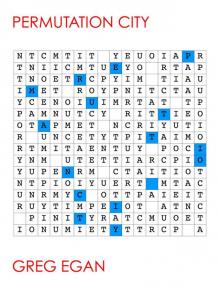 Permutation City
Permutation City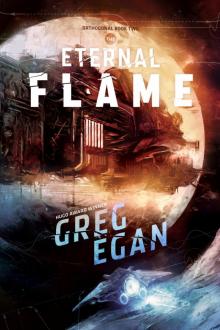 The Eternal Flame
The Eternal Flame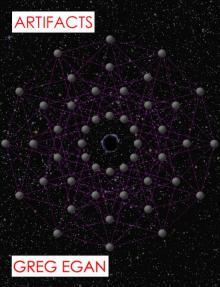 Artifacts
Artifacts Wang's Carpets
Wang's Carpets Dichronauts
Dichronauts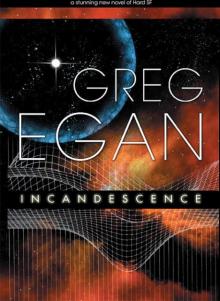 Incandescence
Incandescence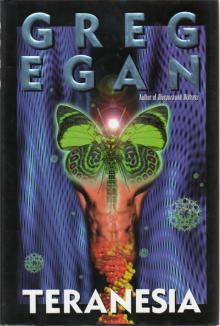 Teranesia
Teranesia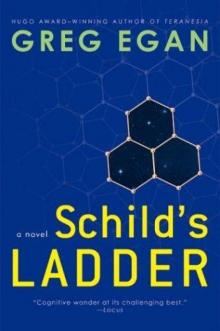 Schild's Ladder
Schild's Ladder Quarantine
Quarantine The Four Thousand, the Eight Hundred
The Four Thousand, the Eight Hundred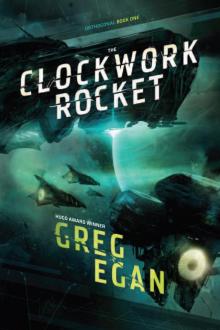 The Clockwork Rocket
The Clockwork Rocket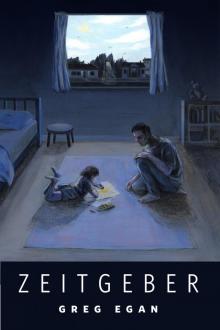 Zeitgeber
Zeitgeber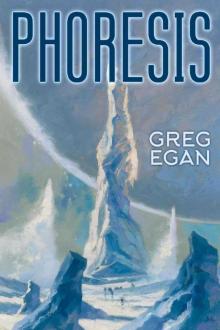 Phoresis
Phoresis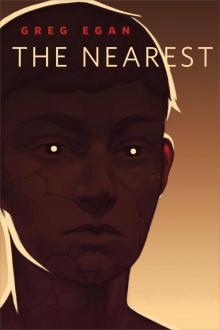 The Nearest
The Nearest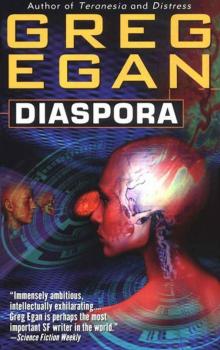 Diaspora
Diaspora Instantiation
Instantiation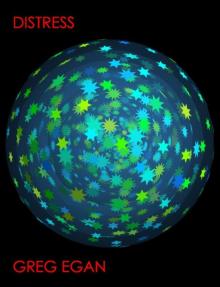 Distress
Distress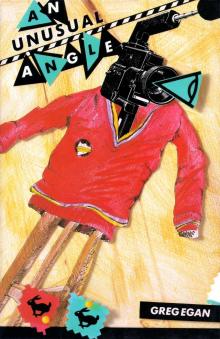 An Unusual Angle
An Unusual Angle Oceanic
Oceanic The Arrows of Time
The Arrows of Time Axiomatic
Axiomatic![Anthology 2. Luminous [1998, 2010] Read online](http://i1.bookreadfree.com/i/03/18/anthology_2_luminous_1998_2010_preview.jpg) Anthology 2. Luminous [1998, 2010]
Anthology 2. Luminous [1998, 2010] Perihelion Summer
Perihelion Summer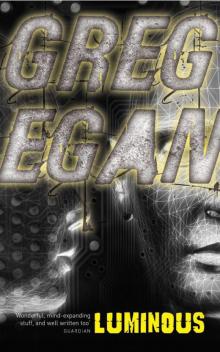 Luminous
Luminous